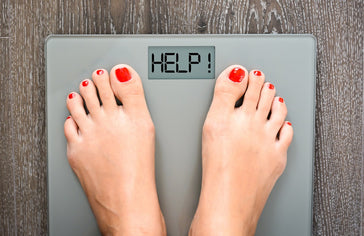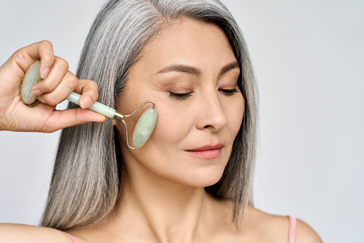Sugar: The Root of All Evil?
Posted by Mike Miryala on
Welcome back everybody. It is Becky Williams and I am back again. So way to go for sticking with us for staying here taking care of yourself, focusing on your body and on your health way to go. I'm really proud of you. Today's topic is going to be about White Sugars, Fructose Sugars, all the other types of sugars. I'm going to talk about - Is Sugar Really the Root of all Evil? Because I talked about the sweeteners either last week or the week before that. But I wanted you to realize that there's more than just artificial sweeteners and then white sugar. There are a couple of different kinds. And so that's what I'm going to be talking about today.
Now, let's talk about what sugar is. It's the bad stuff that's damaging to your body. Okay? This is what we think of anyway. This is causing you to hold on to your unwanted body fat. It's the bad relationship that you keep going back to no matter how many times you say no more, I'm giving up sugar. It's what you turn to when you're feeling happy and when you're feeling sad.
Here in the south, we celebrate everything with food. If there's a funeral there's going to be cake. There's going to be pies. People are going to bring you food. If there's a wedding, there's going to be cake, there's going to be food. Okay, so no matter what the spectrum is, there's always going to be food, especially very much so in places like Louisiana where I am where everything is very deep-rooted in tradition.
Despite your best efforts, you may feel like it's really impossible to avoid sugar, right? Sugar is everywhere. That is true. You feel totally validated, and you're feeling of frustration and anger over not being able to give it up, right? We are all lied to guys. In the 1960s, the sugar research foundation paid by Harvard University Scientists to create a bogus study that shifted the blame for heart disease from sugar onto fat, it was all about business. There was an article published by the National Public Radio that said if Americans could be persuaded to eat a lower fat diet, for the sake of their health, they would need to replace that fat with something else.
So America's per capita sugar consumption could go up by ⅓. Once the truth about sugar was revealed just a few short years ago, it was already too late for most of us. We were hooked right? We've been eating these low-fat diets and over-consuming sugar since birth. We were destined to be sugar addicts. Before we go any further though, let's break down exactly what sugar is. When you're looking at a food label, you want to see the amount of carbohydrates. These are the total carbohydrates. These are also including the sugars. This is the natural sugars and also added sugars. Sugar is a sweet form of carbohydrate.
Now we talked about whenever you're doing an eating plan where you're counting the net carbs, you're gonna be subtracting any sugar alcohols, like I talked about a few weeks ago or last week one of the two, and then you're gonna subtract a fiber. So, but still in your carbohydrate intake, there is gonna be the sugar that's in there. So, here are the different 5 types of sugars that are derived from two sources. So, you have monosaccharides and you have disaccharides.
The 5 types of sugar are Glucose. Now glucose is a monosaccharide or a simple sugar. It's produced by the body when carbohydrates and unused protein are metabolized and digested. Okay, so you may have heard of people talking about their blood glucose. This is what they're talking about. Fructose is also a monosaccharide. It's also called a fruit sugar. This is the sugar found in fruits, honey, agave and tuber vegetables like sweet potatoes, carrots things like that.
Then you have Sucrose. This is a disaccharide. It's likely what you think of whenever you're referring to sugar meaning the white table sugar. But it's actually composed of fructose and glucose and it's also found in fruits and vegetables, too.
Now Lactose this is gonna be the the sugar that's naturally found in dairy milk, and it's also a disaccharide. All right. So sugar alcohol such as erythritol, xylitol, glycerol, the things I talked about in the last bonus video, these are all included in the number of total carbs on a food label, but they're not actually sugar. So these are not the ones that I'm talking about today. So when you think about going sugar-free you quickly realize that whole fresh foods also contain sugar. Ah, so what do you do, right? This is not the same as added sugar in baked goods and bacon and deli meats and processed foods. Not the same. Okay, so don't don't feel frustrated and overwhelmed by this, all right.
The basic difference between natural and added sugar is that natural sugars already exist in certain foods. So while the added sugars are added later to change the taste of the food, people often get confused when they're told to give up sugar or reduce sugar in their diet. They're like what the heck sugars in everything now, I can't eat anything right. They go and they just want to drink water. Whenever you have natural whole foods like fruits and vegetables, they can still be high in sugar, while that's true, added sugar must be avoided. Even excess consumption of high sugar fruits and vegetables can have a negative effect on your body.
So while the added sugar and the natural sugar are different in how they are put into a food or naturally occurring into a food, you still don't want to over consume those things. That's what I'm trying to say here. You might think of added sugar like cane sugar or powdered sugar or brown sugar, but anything added to a sweetened food is an added sugar, okay. So some added sugars do include the cane sugar, the brown sugar, the golden sugar, the date sugar, the coconut sugar.
There are also sweeteners that are added with different names. So you have to kind of watch for it. There's like a ton of names actually. If you just do a quick Google search of all the different names of sugar, how they're added like on a label, it is incredible the amount that's there. So you have like agave fruit, fruit juice concentrate, fructose, Maltodextrin, maple syrup, sucrose, sucralose. There's all just all kinds.
Also added sugar affects different people in different ways. But in general, there's quite a few adverse health effects that do just overall across the books. That kind of happened when you have too much sugar, right?
So weight gain is the first one that we most likely think of. It also just makes it hard to lose the weight, leads to fatigue and drowsiness. Think about Thanksgiving, think about Christmas, if those are celebrations that you're a part of. I mean you're like stuffed right and then people like in our family, we have what we call the magic recliner. Because it seems like after everybody eats, the grandpas and the uncles and the dads and all that they all go sit in that magic recliner and fall asleep. Well, what is it? It's the sugar spike right has nothing to do with a recliner. It's spiking your blood sugar levels. It's lowering your immune system.
Flu season just means that the weather's changing. So maybe your allergies are flaring up a little bit. But most of the time, it's because you’re eating garbage, right? You're increasing that sugar and it's making your immune system compromised. Plus just remember you don't need any added sugars because you're sweet enough anyway, right? All right.
So let's talk about some other negative effects of the body. I didn't want to make this super super long so I'm just gonna give you the overview of it. I could dive so much deeper into each one of these, but I just want to give you a quick list. So first is overload your liver, right? Everything's trying to detox through your body, especially if you don't have a gallbladder, like I don't have a gallbladder. Your gallbladder is not able to help. So you got your livers having issues. It's gonna go into your kidneys, having trying to just detox the body. It just makes it very hard on your body. Also, you might gain weight, increased risk of Type 2 Diabetes.
And also exasperate your mental and mood issues. Oh my gosh, I know this for me to be true whenever I was having a really difficult time with postpartum depression. I've had 3 pregnancies and I've had postpartum depression severely with each one of them. Eating extra sugars and stuff like that just sent me over the edge. It was way worse whenever I wasn't eating whole foods. I mean even eating fruits and things like that. I was okay, but I'm talking about like the processed foods, the added sugar foods, all those just really really made it worse.
Excessive amounts of sugar can also cause tooth decay. Bacteria are gonna thrive in the plaque that forms on your teeth. It's super gross. I'm grossed out even reading that but it's true if you consume extra sugar tooth decay bacteria lives in your mouth. That's gross.
If you're consuming sugar filled foods and beverages instead of high quality proteins and healthy fat, then you could also have bone loss that leads to osteoporosis. All kinds of bad stuff with this sugar stuff here, okay.
So you're wondering, all right, you told me sugars and everything. So what do I do? How do you avoid consuming sugar when it's hidden and when it's called by 15 million different names?
All right, first check your nut butters. You and your nut butters, you should have whatever the nut is. By the way, peanut is not a nut. It's a legume. Okay, so nuts, salt and sometimes oil. Nut and salt would be the best but check your butters. I'm telling you, I have turned over, I've literally sat down in our grocery store, embarrassed the family don't really care. So I down and check the labels of everything, all of the different nut butters before I bought it and it is very difficult to find a nut butter that does not have an added sugar in it, does not have inflammatory oils in it. So make sure that you're checking those labels. Flip it over look at it. See what added sugar is in there. Check the carb amount, okay.
Be careful with your condiments. Condiments are one of the biggest places that you're gonna find added sugar. Flip over those condiments. Find out what it is. There are different brands that are really good that don't have the added sugars or some that even have like a stevia-sweetened condiment is really good. So just be careful with what you do.
Also find sugar-free alternatives. This does not mean sugar-free, you know chemical laden sweeteners, that's not what I'm talking about. I'm talking about like what I was saying with the condiments, finding something that has like stevia in it, something that's sweetened with monk fruit. I know there's a syrup that's sweetened with monk fruit. Okay, find natural alternatives. If you are following an eating plan that allows honey, you can have honey in there. Just remember all of these even if they are better than white granular or chemical sweeteners, you still don't need to overdo them because they will still have adverse effects. So everything in moderation.
All right, and then also navigate to an unprocessed diet. Processed foods are full of sugar. Even your salty things like bacon is gonna have sugar. A lot of your cured meat, they are cured with sugar or with honey, different things like that. Okay, check out your product. Check out your processed foods and have an unprocessed diet. There we go. I'm gonna get it right here in a second.
All right, so I want to end this on a sweet note. See what I did there? This is a recipe from Louise and I's Dessert Cookbook. This is the Chocolate Waffles Recipe and it is super good. Alright, so I'm gonna take you 10 minutes to prep. It's gonna take you 10 minutes to cook and it's gonna do 4 servings. Alright, so if you're trying to have something ready to go in the morning that's nice and filling for your kids, for your husband, for your wife, for your whoever, whomever. This is the recipe for you. All right, so you're gonna need:
- ¾ cup or 90 grams of almond flour
- 4 Tablespoons, which is about 24 grams of unsweetened Cocoa powder
- 3 medium eggs
- ¼ cup or about 60 ml of coconut cream. Make sure it's unsweetened.
- 2 teaspoons or 4 grams of baking powder
- 1 teaspoon or 5 ml of vanilla extract. (Get the pure kind. Don't get the garbage kind that is chemicals and stuff. Don't get the imitation one. It doesn't taste as good. Trust me.)
- Sweetener to taste. Sweetener here, you can use your erythritol. You can use Stevia. You can use monk fruit. You can use xylitol. Just know that if your pets get a hold of anything with xylitol, it's poisonous to them. So any of the sweeteners that you would like and sweeten it to taste. Just make sure that it's one that is good, right?
- Heat a greased waffle maker. You whisk all your ingredients together in a big bowl until it’s smooth. Don’t overmix it.
- Take it, pour the batter into the waffle maker. Boom. Done.
That is how you make Chocolate Waffles. If you have any questions, ofcourse I am in the Facebook every single day, looking out for your questions, looking there to support you. Let me know if you have a favorite dessert that uses a better sweetener, an upgraded sweetener such as Stevia. I would love to know what it is. Share it in the Facebook Group. I will see you next week for another bonus video. Be well. Bye Bye.





